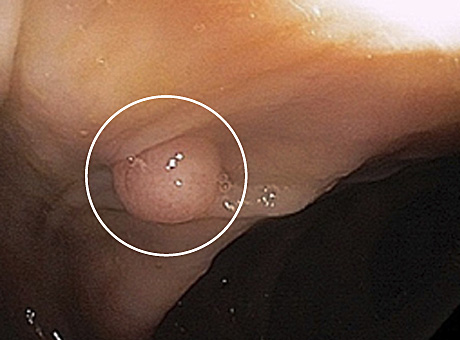
Doctors discover a polyp during a repeat colonoscopy on a study patient who had not prepared adequately for the initial exam.

Doctors discover a polyp during a repeat colonoscopy on a study patient who had not prepared adequately for the initial exam.
What happens the day before a colonoscopy may be just as important as the test itself.
Gastroenterologists at the School of Medicine have found that when patients don’t adequately prep for the test by cleansing their colons, doctors often can’t see potentially dangerous pre-cancerous lesions.
Reporting in the journal Gastrointestinal Endoscopy, the researchers say that doctors often missed at least one pre-cancerous growth in about one-third of patients who did not properly prepare for their colonoscopy. Polyps and other markers of cancer risk were then discovered in subsequent colonoscopies.
Although several studies have found that up to a quarter of colonoscopy patients don’t prepare adequately for the test, the new study is the first to point out the potential consequences of poor bowel preparation in outpatients at average risk.
“Because so many of the patients had a follow-up screening less than a year after the initial test, we strongly suspect that most of the pre-cancerous growths found during the second colonoscopy already were present at the time of the initial test,” says first author Reena Chokshi, MD, a gastroenterology fellow at Washington University.
When patients don't adequately prep for the test by cleansing their colons, doctors often can't see potentially dangerous pre-cancerous lesions.
Researchers say their findings suggest that if a physician is having difficulty seeing the colon due to inadequate bowel prep, the colonoscopy should be stopped and rescheduled.
“Rather than subjecting a patient to the potential risks of a full colonoscopy when we may not be able to detect polyps, or other pre-cancerous growths called adenomas, it may be better to bring that patient back as soon as possible for a repeat procedure with better bowel preparation,” says Chokshi.
On the day before a colonoscopy exam, people are asked to stop eating solid food and to consume only clear liquids. Later in the day and the next morning, patients drink bowel-cleansing mixtures to empty the colon prior to the examination.
The test itself usually takes less than an hour, and patients are sedated during that time. Using a tiny camera, doctors are able to look at the walls of the colon in an attempt to detect polyps and other pre-cancerous growths. Once detected, those growths can be removed during the procedure.
“It generally takes several years for an adenoma to become cancerous,” Chokshi says. “So it certainly is possible that any lesion we miss during a colonoscopy could develop into a malignancy before a person’s next colonoscopy, especially if it doesn’t happen until 10 years later.”